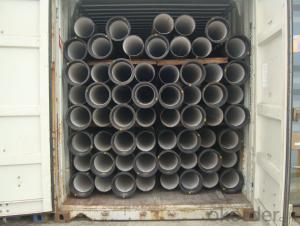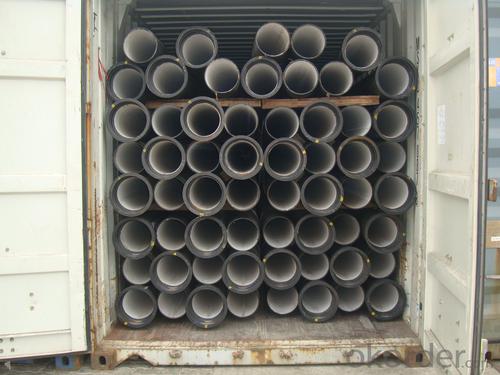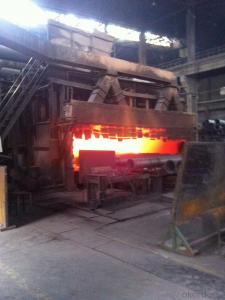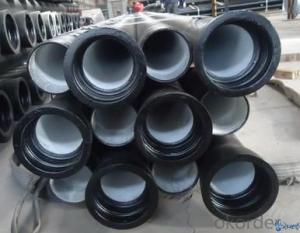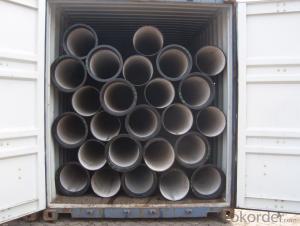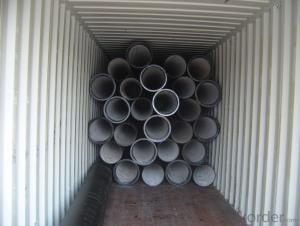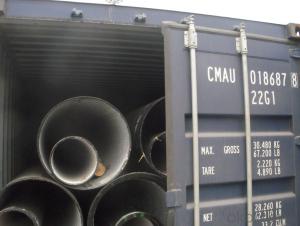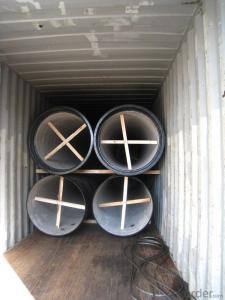DUCTILE IRON PIPES AND PIPE FITTINGS K8 CLASS DN1000
- Loading Port:
- Tianjin
- Payment Terms:
- TT OR LC
- Min Order Qty:
- 22 pc
- Supply Capability:
- 3000 pc/month
OKorder Service Pledge
OKorder Financial Service
You Might Also Like
Material : Ductile Cast Iron
Size Range : DN 80mm to DN 2000mm
Unit Effective Length : 6m or 5.7m
Manufacture Standard: ISO 2531:1998/ EN 545:2006/EN 598:2007
Annual capacity : 200,000 tons
Coating Exterior: Zinc 130g/m2 according to ISO 8179-1 and bitumen coating 70 microns.
Cement Interior: Portland Cement/ High Alumina Cement/ Sulphate Resisting Cement Lining according to ISO 4179
Special requirements on external coating and internal lining can be applied
We also provide accessories such as SBR/EPDM rubber gaskets, lubricant paste, pipe caps, PE sleeves, etc.
Additional Parts:
Each pipe is strictly inspected according to related standard to ensure permanently high performance.
Easy Installation at site and service free for life
Long Service Lifespan
Quotation will arrive you within 24hours once we get your inquiry.
We guarantee offering you a competitive price.
A copy of original inspection reports of pipes will be offered after shipment.
Photos of loading process will be sent to the customer after shipment effect.
We will follow-up the delivery progress after shipment effect and update to the customer on weekly basis.
- Q: Can ductile iron pipes be used in high-pressure applications?
- Yes, ductile iron pipes can be used in high-pressure applications. Ductile iron has excellent mechanical properties and high tensile strength, making it suitable for withstanding high-pressure conditions. Its inherent toughness and durability allow it to handle the stress and pressure exerted on the pipes, making it a reliable choice for various high-pressure applications.
- Q: Are ductile iron pipes suitable for high-temperature applications?
- High-temperature applications are generally not suitable for ductile iron pipes. Despite their strength and durability, ductile iron has limitations in high temperatures. Ductile iron pipes usually have a maximum operating temperature of around 250-300 degrees Fahrenheit (120-150 degrees Celsius). When subjected to higher temperatures, ductile iron pipes can undergo thermal expansion, potentially causing cracks or distortions. This can compromise the pipe's structural integrity, leading to leaks or failures. Additionally, ductile iron is vulnerable to oxidation at elevated temperatures, further deteriorating its performance over time. For high-temperature applications, it is generally advisable to opt for materials specifically designed for such conditions, like stainless steel or high-temperature alloys. These materials offer superior resistance against thermal expansion, oxidation, and other factors associated with high temperatures.
- Q: Can ductile iron pipes be used for seawater intake systems?
- Yes, ductile iron pipes can be used for seawater intake systems. Ductile iron is a type of cast iron that is known for its high strength, durability, and resistance to corrosion. These properties make it well-suited for various applications, including seawater intake systems. Seawater is highly corrosive due to its high salt content, and regular cast iron pipes may be susceptible to corrosion and damage over time. However, ductile iron pipes have a protective coating that acts as a barrier against corrosion, allowing them to withstand the harsh conditions of seawater. Additionally, ductile iron pipes have a higher tensile strength compared to regular cast iron pipes, making them more resistant to the high pressures and stresses associated with seawater intake systems. Overall, ductile iron pipes are a reliable and cost-effective choice for seawater intake systems.
- Q: Are there any special coatings or linings used for ductile iron pipes?
- Ductile iron pipes utilize specialized coatings and linings to protect against corrosion and increase their lifespan. The interior and exterior surfaces of the pipes are treated with these coatings and linings. Several popular options for ductile iron pipes include cement mortar lining, polyethylene encasement, fusion bonded epoxy (FBE) coating, and polyurethane lining. Cement mortar lining is frequently employed to create a safeguarding layer on the inside of ductile iron pipes. This mixture of cement, sand, and water is applied to the pipe's interior surface. By doing so, it effectively prevents corrosion caused by water or other fluids flowing through the pipes. Polyethylene encasement is an additional protective coating used for ductile iron pipes. This method involves enveloping the pipes with a layer of polyethylene material. This barrier protects against environmental factors and inhibits direct contact between the pipe and the surrounding soil, minimizing the risk of corrosion. Fusion bonded epoxy (FBE) coating is a thermosetting epoxy powder coating that is administered to the exterior of ductile iron pipes. This coating provides exceptional corrosion resistance and mechanical protection. FBE coating is often utilized in aggressive environments where pipes are exposed to chemicals or high moisture conditions. Polyurethane lining is another type of lining employed for ductile iron pipes. It offers superior resistance to both corrosion and abrasion. This liquid polymer lining is sprayed onto the interior surface of the pipes, resulting in a smooth and durable protective layer that extends the life of the pipes. These coatings and linings are essential for maintaining the integrity and longevity of ductile iron pipes, ensuring optimal performance in a variety of applications such as water distribution, wastewater management, and industrial processes.
- Q: What is the cost of ductile iron pipes compared to other pipe materials?
- The price of ductile iron pipes can vary depending on a variety of factors, including size, length, and supplier. However, when compared to materials like PVC or steel, ductile iron pipes generally tend to be more expensive. This is primarily due to the manufacturing process and the inherent qualities of ductile iron that make it a durable and dependable choice for various applications. Ductile iron pipes are renowned for their high tensile strength, resistance to corrosion, and durability. These qualities make them suitable for transporting potable water, wastewater, and other fluids under high pressure. The production process for ductile iron involves the addition of magnesium to cast iron, resulting in improved strength and flexibility. This additional step, combined with the quality of the material, contributes to the higher cost. On the other hand, pipes made from materials such as PVC or steel can be less costly. PVC pipes are lightweight, easy to install, and relatively inexpensive, making them a popular choice for low-pressure applications like irrigation or drainage systems. Steel pipes, known for their strength and durability, are often used in high-pressure situations but come with a higher price tag than PVC. In the end, while ductile iron pipes may have a higher initial cost, their longer lifespan and reliability can make up for the investment over time. Other factors, such as project requirements, local regulations, and material availability, can also impact the overall cost comparison between ductile iron pipes and other pipe materials.
- Q: What effect does magnesium play in nodular cast iron?
- Magnesium can be graphite precipitated in spherical form.But the specific mechanism is not clear, and now it is still debated in the academic circles.In addition, magnesium and sulfur generate MgS, which removes S from molten iron, which impedes the formation of spheroidal graphite.Therefore, Mg has two functions to eliminate the influence of S on Nodular Iron and promote the precipitation of graphite in spherical form.
- Q: Water supply pipe is ductile iron, then it's fittings and valves and other parts must be ductile iron?
- Not always。Valve material selection is mainly determined by the fluid medium.The medium can be divided into gas, liquid, corrosive gas, liquid and oil. According to different media, temperature, and pressure levels, choose different materials, plastic, cast iron, cast steel, stainless steel and so on.
- Q: Can ductile iron pipes be repaired if damaged?
- If there is any damage to ductile iron pipes, they can indeed be repaired. The process of repairing them involves several steps. Firstly, it is necessary to identify and isolate the damaged section of the pipe. Once this has been accomplished, the damaged portion of the pipe is typically cut out and removed. Subsequently, a new section of pipe is inserted and connected to the existing pipeline using appropriate methods such as welding or mechanical jointing. The repaired section is then tested to guarantee its integrity and functionality. It is important to note that the repair process may vary depending on the extent and nature of the damage. Therefore, it is always advisable to seek advice from professionals who specialize in ductile iron pipe repairs to ensure a proper and effective restoration is achieved.
- Q: Are ductile iron pipes suitable for underground parking structures?
- Yes, ductile iron pipes are suitable for underground parking structures. They are strong, durable, and resistant to external pressures, making them ideal for use in underground environments where they can withstand heavy loads and potential ground movements. Additionally, ductile iron pipes have excellent corrosion resistance, ensuring long-term performance and minimal maintenance in underground parking structures.
- Q: Can ductile iron pipes be used for underground river crossings?
- Yes, ductile iron pipes can be used for underground river crossings. Ductile iron pipes are known for their strength and durability, making them suitable for various applications including underground river crossings. These pipes have a high tensile strength and can withstand the external loads and pressures exerted by the surrounding soil and water. Additionally, they have excellent corrosion resistance, which is crucial when dealing with underground water sources like rivers. Ductile iron pipes are also capable of withstanding ground movements, settling, and other geological challenges that may occur during the installation and operation of underground river crossings. Therefore, they are a reliable choice for ensuring the safe and efficient transportation of water across rivers while maintaining the integrity of the underground infrastructure.
Send your message to us
DUCTILE IRON PIPES AND PIPE FITTINGS K8 CLASS DN1000
- Loading Port:
- Tianjin
- Payment Terms:
- TT OR LC
- Min Order Qty:
- 22 pc
- Supply Capability:
- 3000 pc/month
OKorder Service Pledge
OKorder Financial Service
Similar products
Hot products
Hot Searches
Related keywords
